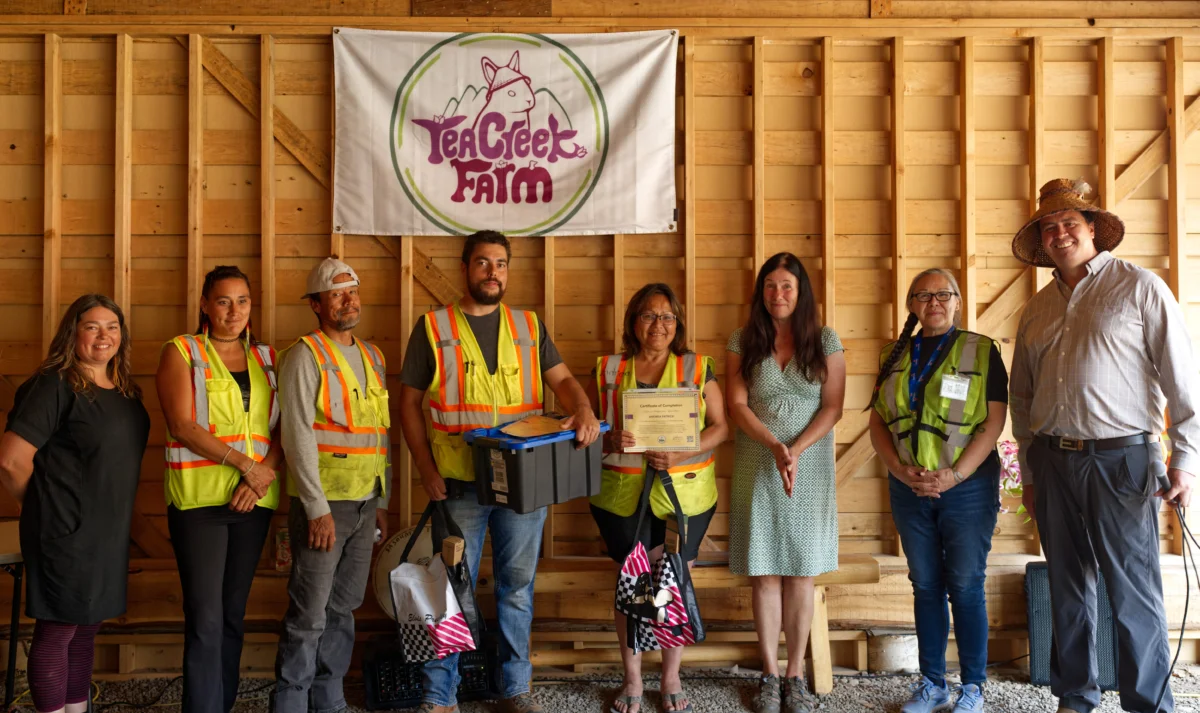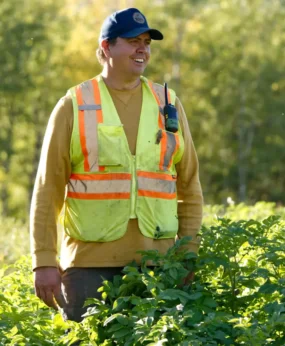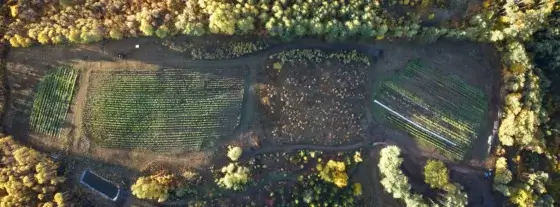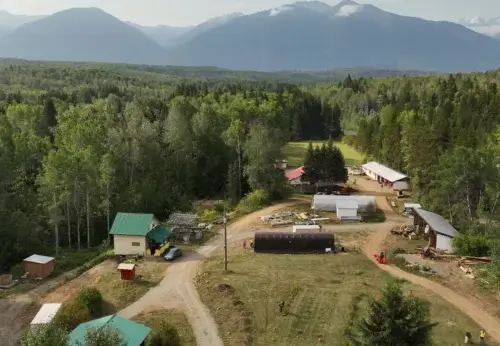Meet the Farmer Training Indigenous Youth and Revitalizing a Culture of Food Sovereignty
An Indigenous-led training hub, Tea Creek, in northern B.C. may be an answer to Canada’s looming farmer shortage.
Meet the Farmer Training Indigenous Youth and Revitalizing a Culture of Food Sovereignty
An Indigenous-led training hub, Tea Creek, in northern B.C. may be an answer to Canada’s looming farmer shortage.

The third cohort of Tea Creek graduates.courtesy of Tea Creek
This story is part of our Future Farmers series, highlighting the joys and hurdles of a career in agriculture today. You can read more of this series here.
Dzap’l Gye’a̱win Skiik translates to busy eagle or an eagle who gets things done. A perfect name for Jacob Beaton. As an Indigenous businessman from the Tsimshian First Nation, he never imagined himself farming or teaching others. He lived a quintessentially suburban life with his wife and two sons before devastating wildfires and floods in B.C. inspired him to start thinking about climate change and food security for his family.
In 2018, they bought Tea Creek, a 140-acre farm outside the village of Kitwanga in northern B.C. With the intent of keeping most of the property forested and only farming a few acres, they settled into farm life. But Beaton had to learn from scratch. He turned to YouTube videos and started visiting other small organic farms throughout the Pacific Northwest and as far away as Europe.

“Farming, ranching, field base food production were a big part of Indigenous culture in this region that got wiped out by the Indian Act,” says Beaton. When the act was enacted in 1876, it took control over land rights and access away from Indigenous populations, which blocked most agricultural opportunities. “Immediately, from day one, our First Nations friends local to the area started dropping by, really excited that we were farming,” he says. Some remembered stories their grandparents and great-grandparents had told about farming in the area and asked Beaton to come to their communities and teach them.
But he was busy learning himself and, as he put it, there’s only one of me to go around. In 2020, the pandemic struck, and with food sovereignty top of mind for Indigenous communities in the region, it quickly became clear to the Beatons that they could do more to help their community and it was time to expand. Developing the Food Sovereignty Training Program, they invited Indigenous people interested in learning how to grow their own food to Tea Creek.
Providing skills training in a culturally appropriate and empowering way is not an easy thing to do, but Beaton is “the eagle who gets things done.”
Realizing that whatever was taught at Tea Creek had to translate into marketable skills and employment opportunities, Beaton enlisted support from SkilledTrade BC. Working with employers, industry and government, Skills Trade BC approves non-public training providers, such as Tea Creek, to train and certify individuals who meet industry and government accreditation standards in their trade of choice. Tea Creek is able to offer apprenticeship programs and train an individual all the way to Red Seal certification. Recognized as the interprovincial standard of excellence in the skilled trades, it is the highest level of training in the country.
Programs run from January to November, and they are open to Indigenous peoples 16 and up at no cost. Meals are provided and bunkhouse accommodation is available. All programs have Indigenous instructors and include carpentry, safety training, first aid, drone mapping, heavy equipment operation, cooking, horticultural training and administration.

Tea Creek is not a school with desks and classrooms. The land is the classroom. All courses are held outside as much as possible. Instructional cohorts are small, ranging from three to six people. This creates better opportunities for instructors and mentors to connect with trainees who in turn receive more hands-on learning experiences.
Arriving at Tea Creek in 2020, Sheldon Good was 23 years old when he learned to repair and operate tractors. He says the experience at Tea Creek motivated him to get up during the day and do things. “The environment is really welcoming and there are really nice people taking care of everything,” he says. Acquiring skills he otherwise wouldn’t have learned, he now works at a sawmill.
Tea Creek though is more than learning to operate a backhoe or tractor. The farming methods taught here include best practices from regenerative and conventional farming. This includes learning how to make fertilizer from compost and using a tractor to till the soil. Beaton’s business savvy has him insisting that trainees leave Tea Creek with a range of economically viable farming skills. With food sovereignty top of mind, traditional Indigenous crops such as corn are grown alongside kale, broccoli and lettuce. In 2022, the first crop of Ozette potatoes was harvested. These fingerling potatoes, renowned for their nutty flavor, were brought to the Pacific Northwest from South America by Spanish settlers 200 years ago. Grown primarily by First Nations peoples, they were rarely known outside of Indigenous communities until the late 20th century.

In 2023, Tea Creek hosted Farmstand Fridays where 20,000 pounds of fresh mixed vegetables were distributed to Indigenous families and communities. Tea Creek also prepares and serves 100 hot meals per day to trainees and staff using vegetables from the farm.
In 2021, Tea Creek’s first year of accredited training, 33 people graduated from Food Sovereignty Training programs. Last year, 292 Indigenous people enrolled in training programs and more than 140 graduated from at least one course.
“Tea Creek, can solve Canada’s farmer shortage. If funded and supported in a real way, Tea Creek could be scaled with multiple training centers across the country.” Jacob Beaton
It’s estimated that, by 2033, 40 percent of all farm operators in Canada will retire. Two-thirds don’t have succession plans in place.
“Tea Creek, I’ve been told,” says Beaton, “in the area of agriculture, outputs more people in a year than any other agricultural training program in the province.” With a waiting list of 75 First Nations from the east to west coasts eager to learn, there is no shortage of enthusiasm.
The legacies of Canada’s Indian Act, though, are far reaching. Canada’s residential school system stripped Indigenous children of their cultural identity and language. This has caused intergenerational harm that continues to be experienced through ongoing marginalization and systemic racism.
In 2023, 93 percent of Indigenous youth attending programs at Tea Creek identified this historical trauma as a factor in their mental health challenges. Through the peer-to-peer counseling Tea Creek offers, the sense of belonging and the purpose it provides through its training, 100 percent of trainees 30 and under, in 2023, reported improvements in their mental well-being. This is Tea Creek’s real success.
“Before I got here, I was really in a dark place,” says Justice Moore, who is featured in the film Tea Creek, part of CBC’s Absolutely Canadian documentary series. “I was getting to the point of, just, no return. That’s the only way I can put it. I wouldn’t be here if Tea Creek weren’t here. That’s a fact.”
This story is part of our Future Farmers series, highlighting the joys and hurdles of a career in agriculture today. You can read more of this series here.
Follow us
This work is licensed under a Creative Commons Attribution-NoDerivatives 4.0 International License.
Want to republish a Modern Farmer story?
We are happy for Modern Farmer stories to be shared, and encourage you to republish our articles for your audience. When doing so, we ask that you follow these guidelines:
Please credit us and our writers
For the author byline, please use “Author Name, Modern Farmer.” At the top of our stories, if on the web, please include this text and link: “This story was originally published by Modern Farmer.”
Please make sure to include a link back to either our home page or the article URL.
At the bottom of the story, please include the following text:
“Modern Farmer is a nonprofit initiative dedicated to raising awareness and catalyzing action at the intersection of food, agriculture, and society. Read more at <link>Modern Farmer</link>.”
Use our widget
We’d like to be able to track our stories, so we ask that if you republish our content, you do so using our widget (located on the left hand side of the article). The HTML code has a built-in tracker that tells us the data and domain where the story was published, as well as view counts.
Check the image requirements
It’s your responsibility to confirm you're licensed to republish images in our articles. Some images, such as those from commercial providers, don't allow their images to be republished without permission or payment. Copyright terms are generally listed in the image caption and attribution. You are welcome to omit our images or substitute with your own. Charts and interactive graphics follow the same rules.
Don’t change too much. Or, ask us first.
Articles must be republished in their entirety. It’s okay to change references to time (“today” to “yesterday”) or location (“Iowa City, IA” to “here”). But please keep everything else the same.
If you feel strongly that a more material edit needs to be made, get in touch with us at [email protected]. We’re happy to discuss it with the original author, but we must have prior approval for changes before publication.
Special cases
Extracts. You may run the first few lines or paragraphs of the article and then say: “Read the full article at Modern Farmer” with a link back to the original article.
Quotes. You may quote authors provided you include a link back to the article URL.
Translations. These require writer approval. To inquire about translation of a Modern Farmer article, contact us at [email protected]
Signed consent / copyright release forms. These are not required, provided you are following these guidelines.
Print. Articles can be republished in print under these same rules, with the exception that you do not need to include the links.
Tag us
When sharing the story on social media, please tag us using the following: - Twitter (@ModFarm) - Facebook (@ModernFarmerMedia) - Instagram (@modfarm)
Use our content respectfully
Modern Farmer is a nonprofit and as such we share our content for free and in good faith in order to reach new audiences. Respectfully,
No selling ads against our stories. It’s okay to put our stories on pages with ads.
Don’t republish our material wholesale, or automatically; you need to select stories to be republished individually.
You have no rights to sell, license, syndicate, or otherwise represent yourself as the authorized owner of our material to any third parties. This means that you cannot actively publish or submit our work for syndication to third party platforms or apps like Apple News or Google News. We understand that publishers cannot fully control when certain third parties automatically summarize or crawl content from publishers’ own sites.
Keep in touch
We want to hear from you if you love Modern Farmer content, have a collaboration idea, or anything else to share. As a nonprofit outlet, we work in service of our community and are always open to comments, feedback, and ideas. Contact us at [email protected].by Jennifer Cole, Modern Farmer
June 26, 2024
Modern Farmer Weekly
Solutions Hub
Innovations, ideas and inspiration. Actionable solutions for a resilient food system.
ExploreExplore other topics
Share With Us
We want to hear from Modern Farmer readers who have thoughtful commentary, actionable solutions, or helpful ideas to share.
SubmitNecessary cookies are absolutely essential for the website to function properly. This category only includes cookies that ensures basic functionalities and security features of the website. These cookies do not store any personal information.
Any cookies that may not be particularly necessary for the website to function and are used specifically to collect user personal data via analytics, ads, other embedded contents are termed as non-necessary cookies.